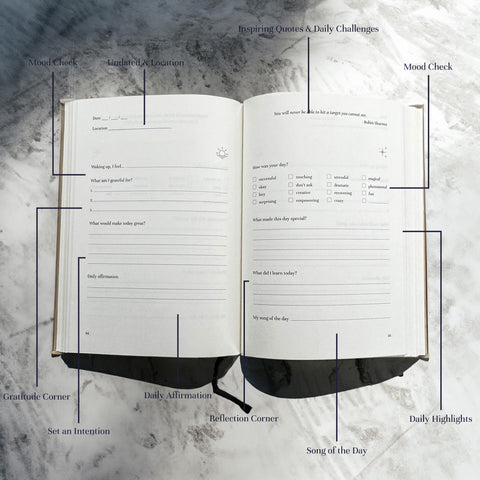Why Personal Accountability Matters: 7 Ways to Take Ownership of Your Life
It’s easy to zoom through the day, week or an entire lifetime without taking the necessary time to evaluate your actions and the path they put you on. And no, we are not only talking to the ambitious individuals pursuing their goals of success. Personal accountability matters, because it empowers you to take ownership of your life and actively work towards positive change.
So let’s figure out what it means to hold yourself accountable, what is likely stopping you now and what you can do to take charge.
"The willingness to accept responsibility for one's own life is the source from which self-respect springs." - Joan Didion
What do we mean by accountability?
Holding yourself accountable means that you evaluate your actions honestly, learn from mistakes, and make necessary adjustments to your behaviour, life goals or important relationships.
People who are accountable know what they want from life. They take responsibility for their actions are not afraid to look at themselves when things are not going as planned. If they have a sense deep down that there are things they should be working on, they don’t evade these thoughts, but ask themselves the uncomfortable questions and take action.
Personal accountability means that you actively remind yourself to live the life that makes you happy.
Signs You Might Be Avoiding Personal Accountability
You think things are outside your control
When you view yourself as powerless, we talk of a victim mentality. While it is natural to feel bad when things go wrong, engaging in self-pity avoids accountability and learning the lessons from your current situation. Instead of asking “Why are bad things happening to me?”, ask “What can I do to make things better?”.
You blame others when things go wrong
While blaming others might provide short-term comfort and protects your ego, it holds you back from growing and from avoiding mistakes in the future. Other people might have very well contributed to a situation, but it’s important to always ask yourself “But what role did I play?”
You find yourself complaining a lot
There are many people who champion the discipline of complaining. There can always be a 1,000 circumstances that made things hard, that stopped you from achieving something or that caused a bad situation. Similarly to finding the blame in others, frequent complaining and making excuses can be a sign that you have difficulties accepting your own flaws. Holding yourself accountable meaning focusing on the things you have control over, on the things you can do better next time.
7 Ways to Hold Yourself Accountable
1 | Set your goals
When we set goals, we turn the invisible into the visible. Setting goals calls for a reality check where you ask yourself where you are and where you want to go. A key requirement for personal accountability.
2 | Break your goals into habits
If we fail to plan, we plan to fail. “Running a marathon” or “prioritising your mental health” are great aspirations, but they only become reality once you break them down into actionable habits, small incremental actions
→ On Tuesdays and Thursdays, I get up at 6am, so that I can go for a run before work.
→ After eating lunch, I will look for a quiet place to meditate.
Learn how to set and stick to new habits in our recent blog post
3 | Reflect and adjust
Make it a habit check-in regularly. Use a journal and set aside some time in your calendar to reflect honestly about questions such as
- What is going well?
- What is not going go so well?
- Do I follow through with what I have set out to do?
- Are there areas that I could improve on?
4 | Get an accountability buddy
Avoiding accountability is often far too easy as no one finds out. Be open with others about what you aim for or want to work on and ask for their advice. They might notice patterns or come up with suggestions you wouldn’t have and most importantly: they keep reminding you to own your actions.
5 | Become aware of procrastination
Procrastination is one of the main enemies of personal accountability. Learn to notice without judgement when you are procrastinating. The better you get at noticing it, the less likely you are to continue doing it.
6 | Practice self-care
We need to hold ourselves accountable to rest as much as action. Not everything works out and not every habit streak lasts. Don’t be too harsh on yourself and take the breaks that you need to be the best version of you. Incorporate som positive affirmations in your day to ensure you practice self-compassion.
7 | Reward yourself
Celebrate your wins! Remind yourself there’s something positive you’re working toward and that every small habit along the way is a step in the right direction.






